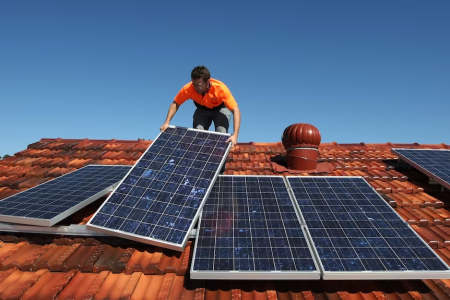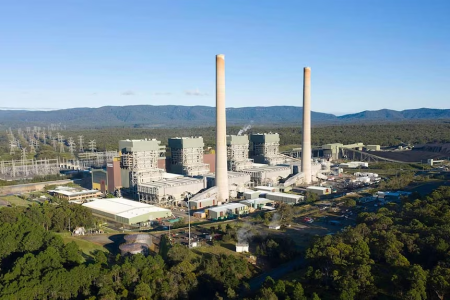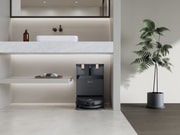Households could spend $80 billion on energy efficiency upgrades, report finds
By
ABC News
- Replies 0
Households across the country are prepared to spend an average of $7,950 up-front to make their homes greener and cheaper to run, a report has found.
But 40 per cent of people surveyed are not likely to transition away from gas appliances and install more sustainable technologies, as they do not understand the impact they will have on lowering household energy use.
The PropTrack Origin Australian Home Energy Report, commissioned by Origin Energy and compiled by REA Group, surveyed attitudes on transitioning households away from gas appliances and installing technologies including solar and battery systems.
More than half (56 per cent) of the 4,800 people surveyed in January planned on making their homes more energy efficient in the coming five years.
Households were budgeting $7,850 in metropolitan areas and $8,400 in the regions for such upgrades.
REA Group senior economist Eleanor Creagh said the upgrades could result in more than $80 billion being spent by homeowners on energy improvements.
"It's encouraging to see that there is a large number of Australians motivated to make these changes," she said.
"Certainly in terms of reaching our long-term net zero goals and electrification, quite a bit more needs to be done in education, incentives and policy."
The responses identified challenges that could slow down the transition of households towards sustainable energy technologies.
Two out of five people surveyed did not know how to improve the energy efficiency of their homes, with "renters and younger Australians facing the biggest knowledge gaps".
There was little awareness of the Nationwide House Energy Rating Scheme (NatHERS) — the government's system for rating the energy efficiency of new homes — as 71 per cent of people said they had no understanding of it.
"There's also a lot of confusion around available government rebates or technologies," Ms Creagh said.
"Many people see energy efficient upgrades as expenses and don't recognise the long-term savings."
"Without better education, many households will continue to be locked out of those benefits."
Upgrading one of the 8 million homes built before energy standards were introduced more than two decades ago could lead to savings of $1,033 each year, according to figures from the Climate Council of Australia.
However, the REA Group and Origin report claims the up-front costs of "electrification" are preventing the trend from picking up speed.
40 per cent of people are thinking about converting their property to electric-only appliances in the future, which is 1 per cent lower than a year earlier.
28 per cent of people ruled out making the change, and 32 per cent were on the fence.
Of the more than 4,800 people surveyed, 6 per cent had ditched gas appliances to go all electric.
"It's probably going to be a pretty slow-moving journey," Ms Creagh said.
"Better and more targeted education and industry support can certainly help people in terms of overcoming knowledge gaps, which are barriers towards making energy efficient upgrades in the home."
The report found 68 per cent of people were motivated to upgrade the energy efficiency of their homes because it often resulted in lower power bills, while 55 per cent recognised the environmental benefits.
Increasingly, electricity is being generated from renewable sources including solar and wind farms in Australia, and so replacing gas appliances with electric alternatives results in less fossil fuels being burned.
Utility provider Origin Energy is a generator and retailer of energy from coal-fired power and gas.
But the shift towards renewables is also underway within the industry, with Origin planning to shut down its Eraring coal-fired power plant and increasing its investment in renewable technologies, including wind farms and battery projects.
Ms Creagh said the policy would help address some of the challenges highlighted by the survey data.
"Up-front costs are a really significant hurdle. For 45 per cent of respondents, they were the biggest deterrent," she said.
"The reduced up-front cost — and coupled with those ongoing savings — are likely to make [installing a solar battery] more attractive option for households."
The government estimates the $2.3 billion program will add more than 1 million new batteries by 2030.
The most common measures were turning off lights (52 per cent) and appliances (42 per cent).
Age clearly delineated who was adopting energy-saving habits, the report found.
People over the age of 65 were most likely to have changed their habits, but also had "the financial ability to fund upgrades".
Meanwhile, 41 per cent of people under the age of 35 were prepared to cut their energy use — 6 per cent more than the average.
"The survey responses really showed that younger Australians are facing higher levels of climate anxiety, and they certainly do care about making these changes," Ms Creagh said.
"But in many ways, they're unable to because a higher proportion of them are renters, and feel like they don't have control over making those energy-efficient changes in the home."
Renters wanting to act could install smart plugs, LED lights and talk to their landlords about upgrades, the report said.
By business reporter Tony Ibrahim
But 40 per cent of people surveyed are not likely to transition away from gas appliances and install more sustainable technologies, as they do not understand the impact they will have on lowering household energy use.
The PropTrack Origin Australian Home Energy Report, commissioned by Origin Energy and compiled by REA Group, surveyed attitudes on transitioning households away from gas appliances and installing technologies including solar and battery systems.
More than half (56 per cent) of the 4,800 people surveyed in January planned on making their homes more energy efficient in the coming five years.
Households were budgeting $7,850 in metropolitan areas and $8,400 in the regions for such upgrades.
REA Group senior economist Eleanor Creagh said the upgrades could result in more than $80 billion being spent by homeowners on energy improvements.
"It's encouraging to see that there is a large number of Australians motivated to make these changes," she said.
"Certainly in terms of reaching our long-term net zero goals and electrification, quite a bit more needs to be done in education, incentives and policy."
The responses identified challenges that could slow down the transition of households towards sustainable energy technologies.
Two out of five people surveyed did not know how to improve the energy efficiency of their homes, with "renters and younger Australians facing the biggest knowledge gaps".
There was little awareness of the Nationwide House Energy Rating Scheme (NatHERS) — the government's system for rating the energy efficiency of new homes — as 71 per cent of people said they had no understanding of it.
"There's also a lot of confusion around available government rebates or technologies," Ms Creagh said.
"Many people see energy efficient upgrades as expenses and don't recognise the long-term savings."
"Without better education, many households will continue to be locked out of those benefits."
Gas switch lacks momentum
Replacing gas cooktops, hot water systems, heaters and other appliances with electric alternatives can result in lower overall energy bills and reduce emissions by running on electricity generated by renewables.Upgrading one of the 8 million homes built before energy standards were introduced more than two decades ago could lead to savings of $1,033 each year, according to figures from the Climate Council of Australia.
However, the REA Group and Origin report claims the up-front costs of "electrification" are preventing the trend from picking up speed.
40 per cent of people are thinking about converting their property to electric-only appliances in the future, which is 1 per cent lower than a year earlier.
28 per cent of people ruled out making the change, and 32 per cent were on the fence.
Of the more than 4,800 people surveyed, 6 per cent had ditched gas appliances to go all electric.
"It's probably going to be a pretty slow-moving journey," Ms Creagh said.
"Better and more targeted education and industry support can certainly help people in terms of overcoming knowledge gaps, which are barriers towards making energy efficient upgrades in the home."
The report found 68 per cent of people were motivated to upgrade the energy efficiency of their homes because it often resulted in lower power bills, while 55 per cent recognised the environmental benefits.
Increasingly, electricity is being generated from renewable sources including solar and wind farms in Australia, and so replacing gas appliances with electric alternatives results in less fossil fuels being burned.
What about Labor's solar battery subsidy?
The survey data was collected in January, before the federal Labor government was re-elected, and before it campaigned on 30 per cent subsidies for solar battery costs for households, small businesses and community facilities.Utility provider Origin Energy is a generator and retailer of energy from coal-fired power and gas.
But the shift towards renewables is also underway within the industry, with Origin planning to shut down its Eraring coal-fired power plant and increasing its investment in renewable technologies, including wind farms and battery projects.
Ms Creagh said the policy would help address some of the challenges highlighted by the survey data.
"The reduced up-front cost — and coupled with those ongoing savings — are likely to make [installing a solar battery] more attractive option for households."
The government estimates the $2.3 billion program will add more than 1 million new batteries by 2030.
Saving dollars by changing habits
70 per cent of people surveyed had changed their habits to cut down their energy use in the past year, motivated primarily by the high cost of living.The most common measures were turning off lights (52 per cent) and appliances (42 per cent).
Age clearly delineated who was adopting energy-saving habits, the report found.
People over the age of 65 were most likely to have changed their habits, but also had "the financial ability to fund upgrades".
Meanwhile, 41 per cent of people under the age of 35 were prepared to cut their energy use — 6 per cent more than the average.
Renters: climate anxiety but no control
The report concluded "renters, younger Australians, and lower-income households face the greatest challenges" when it came to lowering both their household energy bills and carbon footprint."The survey responses really showed that younger Australians are facing higher levels of climate anxiety, and they certainly do care about making these changes," Ms Creagh said.
"But in many ways, they're unable to because a higher proportion of them are renters, and feel like they don't have control over making those energy-efficient changes in the home."
Renters wanting to act could install smart plugs, LED lights and talk to their landlords about upgrades, the report said.
By business reporter Tony Ibrahim









